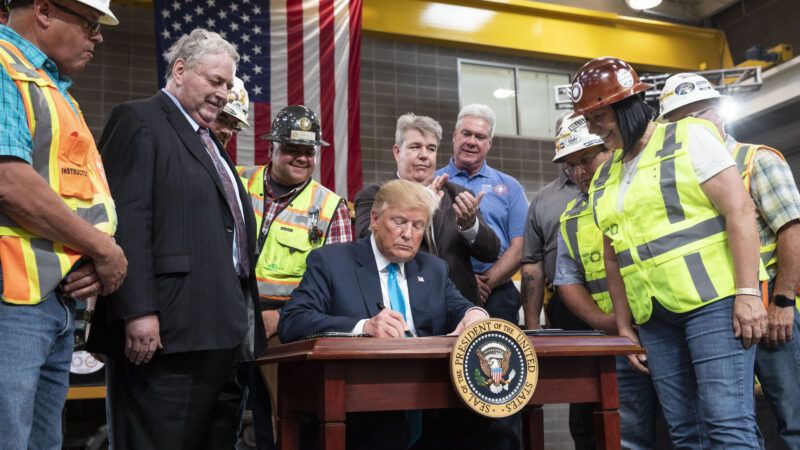Trump Laid the Groundwork for Biden's Infrastructure Boondoggle
It's Biden's bill, but Trump helped set the stage.

The $1.2 trillion infrastructure bill that passed in the House last week is largely a product of the Democratic Party as organized under President Joe Biden. The bill—a hodgepodge of spending on roads, bridges, rural telecom, and public transit that will surely increase the deficit and probably make constructing new infrastructure more onerous and more expensive—was passed via a Democrat-controlled House and Senate, and backed by a president who has served as an avatar of Democratic Party policy priorities for his entire career. When the bill inevitably fails to produce clear benefits, when it bogs down construction work and produces the same sort of absurd yet predictable nonresults as the stimulus bill passed in 2009 under former President Barack Obama, it will be fair to place the blame on Biden and his party.
But the bill also resembles Trump-era federal infrastructure initiatives. And it was backed not only by the vast majority of congressional Democrats but by 19 Republicans in the Senate and 13 GOP lawmakers in the House; indeed, given Democratic defections, it was arguably House Republican support that pushed the bill into final passage. So it is also fair to say that the trillion-dollar infrastructure boondoggle is the product of former President Donald Trump and his lingering influence on the Republican Party, and its failures will belong to them as well.
Trump, you may remember, constantly touted a federal infrastructure plan as one of his major policy objectives, holding any number of supposed "infrastructure weeks," to the point where the phrase became a joke. There was indeed something absurd about the charade and the consistent manner in which it was interrupted or overstepped by more attention-grabbing events. But the goal itself was very real.
Trump famously has a background in real estate, and described himself as the "builder president." His administration backed a number of infrastructure proposals, most in the $1 trillion to $1.5 trillion range. Trump's plan was admittedly somewhat smaller in scope than Biden's: It planned to leverage $200 billion in new federal spending in hopes of attracting state, local, and private spending to projects. As was often the case with Trump policies, many of the specific project details were vague.
But Trump's plan shared a core sensibility with Biden's infrastructure bill, which doles out much of its funding in large grants to states: The idea was that the federal government, one way or another, should spend hundreds of billions to back various building and construction projects around the country in the hopes of creating domestic jobs and boosting national competitiveness. Naturally, both Biden and Trump framed their infrastructure plans as investments.
Biden's plan, which according to Congressional Budget Office estimates will add as much as $400 billion to the federal deficit, might be better characterized as a disinvestment in the future, since it is funded through borrowing. But there, too, you can see Trump's influence on the bill: Under Trump, the Republican Party gave up even the pretense of caring about the growth of federal spending. It passed a series of giant spending bills prior to the pandemic, and then supported roughly $4 trillion in deficit-financed COVID-19 aid in 2020 while Trump was still in the White House, leading to the largest annual budget deficit in history by far.
The Republican Party, of course, had run up deficits while in power in Washington before, but never at the scale we saw in 2020. And Trump's total lack of interest in meaningfully limiting the growth of federal spending or debt and deficits—his campaign-trail plan to eliminate the debt was a joke—helped condition some in the party to go along with big, deficit-financed spending packages. It was Republicans under Trump who brought back trillion-dollar deficits, and it is Republicans under Biden who are helping his spending plans along.
To be fair to the pro-infrastructure Republicans, some have argued that their support for the infrastructure bill is designed to drive a wedge into the Democratic caucus in hopes of preventing an even bigger partisan bill from passing later. But it's just as easy to see the GOP votes as easing the process along.
And to be fair Trump, he sent out a missive castigating Republicans in the House who voted for Biden's infrastructure plan. But consistency has never exactly been one of Trump's hallmarks, and the Biden infrastructure plan looks an awful lot like the infrastructure week that Trump kept trying and failing to have while in the White House. In any case, at least one of the pro-infrastructure Republicans, Rep. Nicole Malliotakis (R–N.Y.), credited Trump for having "laid the groundwork for this infrastructure to pass." It's Biden's bill, but Trump helped set the stage.


Show Comments (215)